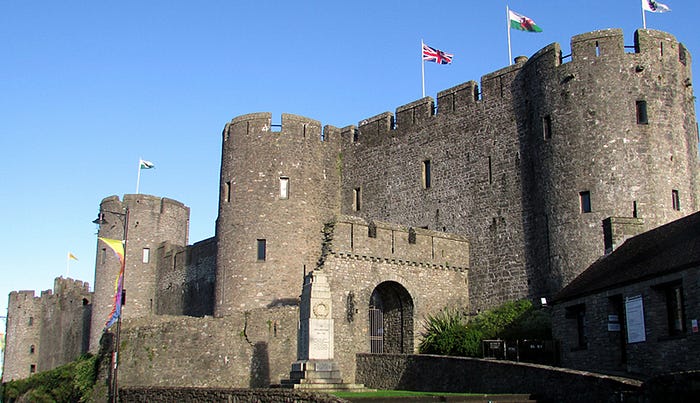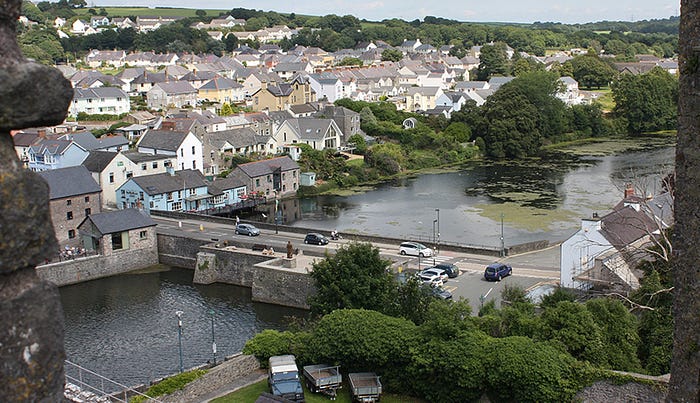Henry Tudor: a Welsh hero…?
Dr Richard Marsden of the Open University’s History department recently contributed to Putting Henry on the Map, a BBC Radio Wales programme about the execution of an eight-foot bronze statue of King Henry VII of England at his birthplace of Pembroke in West Wales. Here, he discusses what the campaign for the statue can tell us about the ambiguous reputation of Henry in Wales today.

The installation of a statue of Henry VII in front of Pembroke Castle, where the future king was born, could be seen as an act of national sentiment. Surprisingly, however, this monument to the only Welshman ever to sit on the English throne was not the brainchild of the Welsh Tourist Board, Pembrokeshire County Council or the Welsh heritage organisation Cadw. Instead, as BBC Radio Wales has highlighted, it was the result of a four-year grass-roots campaign by local residents.

Henry came to power by defeating the infamous Richard III at the Battle of Bosworth in 1485. He could claim descent from medieval Welsh nobility on his father’s side and was lionised by the Welsh gentry, many of whom threw their support behind him as the home-grown candidate during the closing years of the Wars of the Roses. Indeed, his accession to the throne was celebrated by contemporary bards as the fulfilment of an ancient prophecy promising that the Welsh would one day retake Britain from the English.
On the face of it, Henry seems an obvious icon of modern Welsh identity; one of a pantheon of historic heroes whose ranks include Hywel Dda, Llywelyn the Great and Owain Glyndwr. Yet he is today a rather disregarded figure in Wales. Indeed, in a 2002 poll of Wales’s hundred greatest heroes, Henry came fifty-third with just 142 votes. The campaign to erect a statue of him in Pembroke gathered momentum only following the discovery of Richard III’s remains under a carpark in Leicester. As such, it is more a present-day replaying of fifteenth-century dynastic politics than an expression of Welsh national pride in the achievements of a favoured son.


This lack of regard for Henry amongst Welsh people today can perhaps be explained by the fact that, to modern eyes at least, he failed to deliver for Wales once secure upon the English throne. True, he raised some Welsh favourites to positions of power and added the red dragon of Wales to the Royal coat of arms. But he did little to combat the lawlessness and misrule that were endemic in Wales during that period. Nor did he address the position of the Welsh as second-class citizens in their own land. What’s more, his son Henry VIII was responsible for the Laws in Wales Acts (1535 and 1542) which, amongst other things, banned the Welsh language from the law courts and barred Welsh speakers from public office.
Any modern attempt to cast Henry as a hero of Welsh history is therefore fraught with problems. He can fulfil that role for people who are comfortable thinking of Wales as part of a greater British whole. But he sits less well with those who, whilst not necessarily advocating political independence, nevertheless view Wales’ historic relationship with England in more ambivalent terms.
From that perspective, we can start to see why, despite his achievements, Henry is not as celebrated in Wales as might be expected. It is also worth remembering that Pembroke, where Henry was born and where his statue was recently installed, is an overwhelmingly English-speaking area. Had he hailed from somewhere like Ceredigion or Gwynedd, where the Welsh language remains strong, efforts to memorialise him might not have been so successful.
To learn more, listen to Putting Henry on the Map on BBC iPlayer Radio .

Dr Richard A Marsden is Lecturer in History at The Open University. This article was previously published on OpenLearn in January 2018. Subscribe to our newsletter for more free courses, articles, games and videos.

